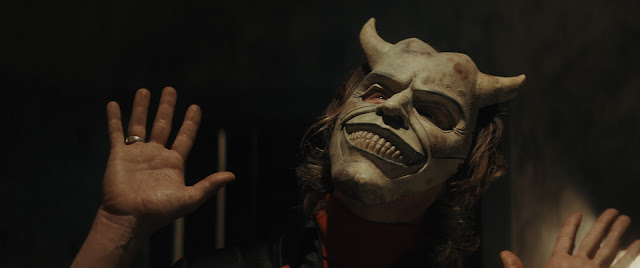- Get link
- X
- Other Apps
- Get link
- X
- Other Apps
 |
| Ethan Hawke as THE GRABBER in THE BLACK PHONE |
Scott Derrickson's The Black Phone is a rare gem. This mid-budget horror film from the reputable Blumhouse Productions delivers on all cylinders. It's a genuinely tense movie with solid performances, a well-crafted screenplay, and spare but effective jump scares. While this reviewer finds that the most creative fright flicks are being delivered by small-budget indie filmmakers, The Black Phone proved to be a pleasant exception to this rule. Based on a short story by Joe Hill, the son of Stephen King, The Black Phone is directed by Scott Derrickson, with screenplay co-written by Derrickson and C. Robert Cargill.
It's 1978 in a small town near Denver, Colorado, and children are going missing – specifically teenage boys. After a period of introduction, a quiet and somewhat passive boy named Finney (Mason Thames) is kidnapped by The Grabber (Ethan Hawke) and locked in a basement with no means of escape. As Finney's sister Gwen (Madeleine McGraw) desperately tries to use her psychic dreams to find the hideout, Finney finds aid by way of the black phone, a disconnected landline that mysteriously allows him to speak to the voices of the Grabber's previous victims. These tween and teen boys died trying to escape. Will Finney join their ranks or use their knowledge to succeed where they failed?
 |
| [L-R] Madeleine McGraw as GWEN, Mason Thames as FINNEY in THE BLACK PHONE |
The Black Phone captures the volatile energy of late 1970s culture, when parents and kids began to suspect the world was no longer safe. It's the time before Stranger Danger and anti-bullying campaigns filled school hallways, and a serial killer could be lurking around every shadowy corner. Cinematographer Brett Jutkiewicz captures the look through lighting and lens choices, while the costume and hair teams dress the characters in decade-appropriate styles. But unlike many TV shows and movies set in the recent past, the filmmakers don't lean heavily into pop culture references or nostalgia. The setting stays in the background and captures a feel without calling attention to itself.
The movie grants an insider view of Finney's life before pivoting to his abduction. This unassuming boy lives a life of quiet desperation. A trio of boys bullies him for being different. His father, Terrence (Jeremy Davies), spends his time at home drinking himself to sleep and leans towards violence when disciplining his children. Finney's saving grace – his sister Madeleine – acts as his emotional center. He also has a tough friend named Robin (Miguel Cazarez Mora), who defends Finney from the bullies but also warns him that a day is coming when he will need to stand up for himself. By the time Finney wakes up in the Grabber's basement, we have seen how he handles life's challenges. This sets viewers up to invest more deeply in Finney's trials and exult in his triumphs. The payoff is greater, thanks to this setup.
 |
| [L-R] Brady Hepner as VANCE, Mason Thames as FINNEY in THE BLACK PHONE |
Blessedly, Derrickson knows how to direct child actors. The two leads, Mason Thames as Finney and Madeleine McGraw as Gwen, both give standout performances. Audiences will easily identify the talent in McGraw's more dynamic role. She's the more outspoken and extroverted of the two. In one scene, Terrence beats Gwen for sharing her dreams with the police officers. Her realistic portrayal of a child in distress took my breath away. But Thames does more subtle work due to his character's quieter nature. And when you look at how many situations he must act out alone in a basement, his talent is undeniable. The tendency can often be for directors to unknowingly bring out child performances that come across as cutesy, robotic, or unnatural with their enthusiasm. Derrickson respects his young actors and brings out the best in them. In addition to Thames and McGraw, four other actors play the previous victims, and Derrickson gives each of them a unique back story and temperament.
Ethan Hawke – the same sweet precious boy who played the demure Todd Anderson in Dead Poet's Society and then became a teen heartthrob in the Before trilogy – continues his trajectory into the gruesome and grisly by playing a creepy masked serial killer. The character's proclivity for wearing masks doesn't require the full spectrum of acting that would make this a career-best role, but Hawke uses his body language and voice to put forth a sinister presence. With a mask, the imagination runs wild at what could be hiding underneath. It was enough for me to feel truly frightened for Finney's fate.
 |
| Mason Thames as FINNEY in THE BLACK PHONE |
The well-crafted screenplay wastes no time with extra padding. Before Finney's capture, we get to know his character. We also see him interact with a few of the boys who will eventually be his beyond-the-grave guardian angels. Once he ends up in the basement, the terror mounts. His conversations with the Grabber build the suspense, while the phone calls with the various boys drop important clues and build up Finney's character. While some of the spoken lines defy logic (one character seems obsessed with his memories of Finney's pitching arm), each seemingly insignificant detail comes together in an exhilarating climax, reminiscent of early M. Knight Shyamalan films like Signs and The Sixth Sense.
The Black Phone is a taut and engaging thriller that surprised me in every way. Like the best Stephen King adaptations, this adaptation of a Joe Hill story combines horrific scenarios with characters that captivate – both good and evil. Do you hear The Black Phone? It's ringing for you.
- Get link
- X
- Other Apps

Comments